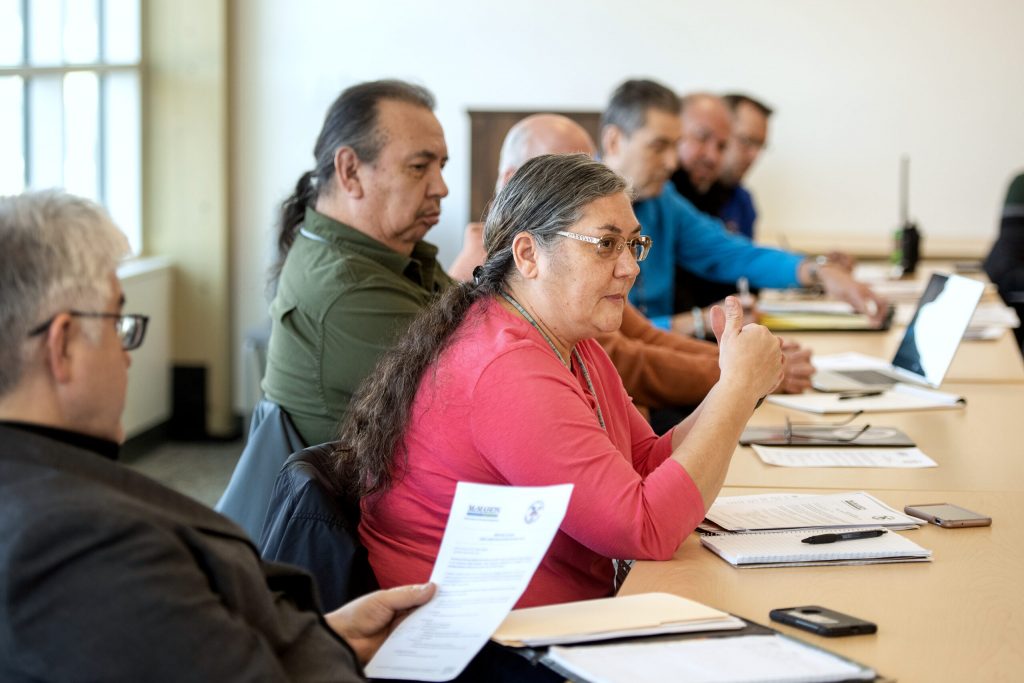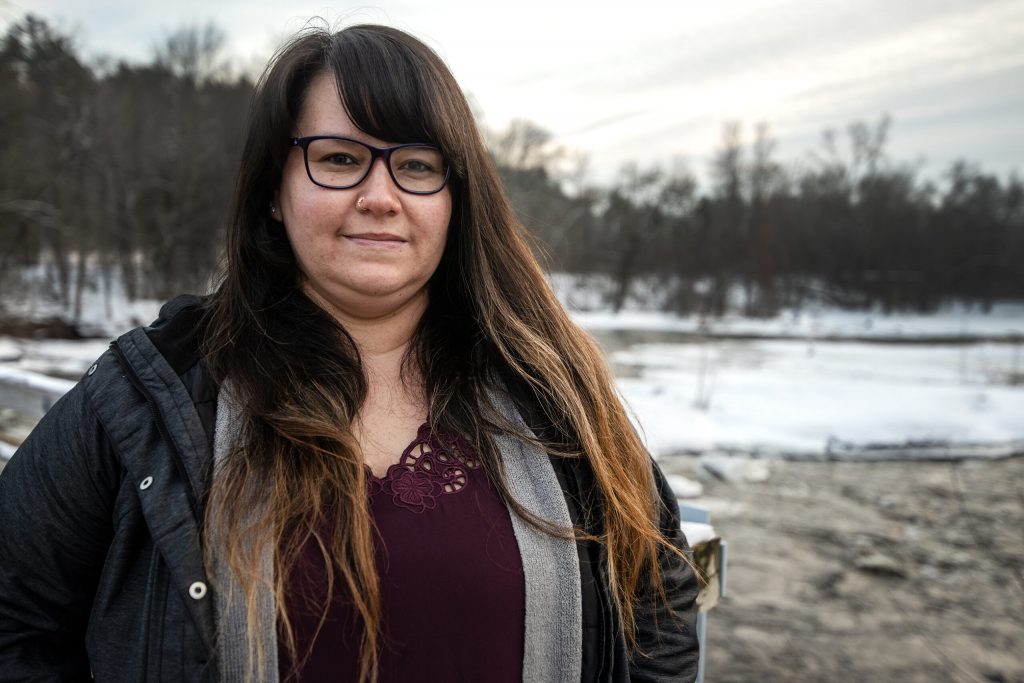Menominee Tribe Has 70% Decline in Overdose Deaths, Hospitalizations
More education, increased supply of fentanyl test strips and Narcan credited.

The doors of the Menominee Tribal Police station on Monday, Jan. 9, 2023, in Keshena, Wis. Angela Major/WPR
The Menominee Indian Tribe of Wisconsin has seen a sharp decline in overdoses resulting in hospitalization or death this year, after two years of record-high overdose deaths on the reservation.
So far this year, the tribe has seen a nearly 70 percent decrease in overdoses leading to hospitalizations or deaths, the Menominee announced in a recent news release.
“This fight may never be over, but we will continue to work together to find solutions that lead to healthy outcomes for our communities, now and in the future,” Warrington stated.
In 2022, the Menominee declared a state of emergency related to the impacts of drug use and addiction. That year, Menominee County, home to the tribe’s reservation, had the highest overdose death rate in all of Wisconsin.
In May, the U.S. Centers for Disease Control and Prevention reported that overdose deaths declined nationally by 3 percent from 2022 to 2023.
But the Menominee actually saw an increase from 2022 to 2023. The tribe recorded 16 overdose deaths in 2022 and 19 in 2023, according to Addie Caldwell, Director of Wellness Programs at Maehnowesekiyah Wellness Center and co-chair of the Drug Addiction Intervention Team.
“Last year, by far, was our greatest year of loss,” Caldwell said.
The tribe has only seen three overdose deaths so far this year, marking a significant change, Caldwell said.
She said the tribe declaring a state of emergency in 2022 led to a community meeting that generated ideas about how to address the opioid crisis. That meeting then led to increased cooperation between local organizations through the Drug Addiction Intervention Team to expand outreach and find gaps in existing addiction resources.

A meeting about opioid addiction intervention is held Monday, Jan. 9, 2023, in Keshena, Wis. Angela Major/WPR
“That team was really formed to look at the problem as a whole, and from there, we all collaboratively made these goals,” Caldwell said. “I feel like that was a huge part of making or decreasing those overdose levels.”
“At the end of the day, these are our brothers, these are our sisters, these are our moms, our dads. It’s our community,” she said. “The easiest thing about addiction is that we can point fingers, and we can blame people. But it is a community issue.”
Caldwell said the tribe also used data to find “hot spots,” places in the community with a disproportionate number of overdoses, and “hot times” when overdoses were happening more frequently. Using that data, she says the community was able to get recovery coaches on the ground to help make people aware that resources were available.
She said the community also worked on harm reduction, which included increasing the supply of fentanyl test strips and Narcan. Fentanyl test strips are small strips of paper that can detect the presence of fentanyl in different kinds of drugs, and Narcan is a medication that rapidly reverses the effects of an overdose.
“Narcan is critical,” Caldwell said. “I know there’s a lot of opinions out there thinking that we’re giving this stuff out, and it just is making people overdose or use more. But in all reality, it’s saving a life. It’s nothing more than that.”

Director of Maehnowesekiyah Wellness Center Addie Caldwell on Monday, Jan. 9, 2023, in Keshena, Wis. Angela Major/WPR
Caldwell said she believes making Narcan available to “anyone and everyone” is likely the “No. 1 thing that changed within this community to help drop our overdose rates.”
There’s also been a mindset shift in the community, she said, especially among the tribe’s young people, where individuals are more willing to ask for help and acknowledge a desire to change.
“We actually are trying to increase our interventions or almost prevention-type efforts within our schools,” Caldwell said. “We’re trying to get in there earlier and earlier, or provide opportunities to our parents to just have some discussion.”
While the Menominee are encouraged by the sharp decrease in overdose deaths and hospitalizations, Caldwell says there’s still work to do. She views it as an investment that will pay off for future generations.
“This is work that is going to continue to need attention,” she said. “Just like someone that’s in recovery, that’s something they have to work on for the rest of their lives, we’re going to keep fighting against drugs and alcohol and all the things that come with addiction.”
Menominee tribe sees sharp decrease in overdose deaths, hospitalizations was originally published by Wisconsin Public Radio.
If you think stories like this are important, become a member of Urban Milwaukee and help support real, independent journalism. Plus you get some cool added benefits.
More about the Opioid Crisis
- Baldwin Demands Trump Admin Reverse Billions in Cuts From Opioid and Mental Health Programs - U.S. Sen. Tammy Baldwin - Jan 14th, 2026
- Fox Valley Nurse Practitioner Sentenced to Federal Prison for Unlawful Prescribing - U.S. Department of Justice - Dec 29th, 2025
- County Executive David Crowley Hosts Roundtable on Combating Opioid Crisis and Saving Lives in Wisconsin - David Crowley - Dec 16th, 2025
- Co-Chairs Criticize DHS For Lack of Plan, Transparency with Opioid Settlement Funds - Joint Committee on Finance - Oct 21st, 2025
- Opioid Treatment Program Opens First Clinic in Milwaukee - Isiah Holmes - Oct 20th, 2025
- County Executive Crowley, Chairwoman Nicholson Sign Legislation Approving $9 Million for Efforts to Compat the Opioid Crisis - David Crowley - Aug 15th, 2025
- How Are State’s Local Governments Spending Opioid Settlement Payouts? - Addie Costello - Aug 4th, 2025
- MKE County: How County Will Spend $9 Million in Drug Settlement Funds - Graham Kilmer - Jul 29th, 2025
- Milwaukee County Executive David Crowley Announces Over $9 Million for Initiatives to Combat Opioid Epidemic - David Crowley - Jul 17th, 2025
- AG Kaul, 45 Other Attorneys General Plan to Join $720 Million Settlement with Eight Opioid Drug Makers - Wisconsin Department of Justice - Jul 14th, 2025
Read more about Opioid Crisis here


















This is am amazing decrease. So glad to see harm reduction, education, and narcan working!